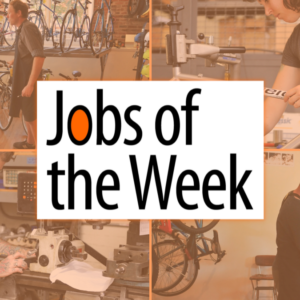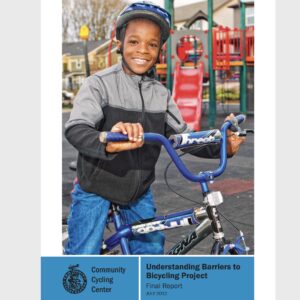The Cycling Against Hate ride, planned in response to an ugly pepper-spraying incident in northeast Portland last week, happened on Sunday. BikePortland correspondent Ted Timmons was there and shares the following recap…
Advertisement
About 90 riders showed up; including familiar faces like former mayoral candidate Sarah Iannarone, Community Cycling Center CEO Mychal Tetteh and author, publisher, and activist Elly Blue. Organizer Taz Loomans had a family emergency to attend to so Elly stepped in to lead it.
We started with a moment of silence, then community members and leaders spoke.
After being introduced by Mychal Tetteh of Community Cycling Center, Sarah Iannarone spoke, challenging us to become a more inclusive city and especially a more includive bike community. “Get educated, further educated. Please, read a book, talk to your colleagues”. Here’s video of her speech:
Longtime friend of the family Wendy Williams also spoke about how this hate crime has impacted the children, then thanked the bike community for showing up to support the family.
A few local news crews, who kept a low profile, were there: KATU, KGW, KPTV.
It was nice that they didn’t overwhelm the event, but tried to quietly report on it.
– Ted Timmons, @tedder42
BikePortland is supported by the community (that means you!). Please become a subscriber or make a donation today.










Thanks for reading.
BikePortland has served this community with independent community journalism since 2005. We rely on subscriptions from readers like you to survive. Your financial support is vital in keeping this valuable resource alive and well.
Please subscribe today to strengthen and expand our work.
No people of color ride bikes?
Yes. Mychal was riding (see pictures and text). So was a neighbor, who rode with her two enthusiastic kids. She learned how to ride three weeks ago and rode ~15 miles. Pretty cool.
Sorry I actually wasn’t trying to be snarky, I just would have expected a more multi-ethnic turnout for this ride. Then again, this is Portland.
I didn’t think you were being snarky, unfortunately. It was not exclusively white. In any case, what are you doing to improve nonwhite turnout or improve inclusivity?
There were more than a few comments at the event by people saddened when they read comments to this story on BikePortland. To commenters (including myself), you might ask yourself how you represent yourself and how you represent the BikePortland comment section.
I don’t have the answers. Then again I’ve never thought of riding my bike as being part of some exclusive “club”. I just ride my bike like everyone else and do my best to survive while doing it.
Maybe I’m blind but what exactly are the barriers to riding? There are plenty of bikes out there and roads to ride them on (if you are brave enough in some cases). Just do it.
I’d actually be curious what _anyone_ did to reach out and make sure the ride was more “inclusive”. Was the ride promoted outside the (predominantly white) cycling community? (No attempt at snark or judgement, just genuinely curious.)
Since white people are the ones who primarily benefit from structural racism, it’s our job to start to show up and organize against racism, which is not what usually happens.
What are the primary goals of “organizing against racism”? The problem I have is it is hard for me to identify specific areas where I can try to effect change. The issue feels very nebulous.
I also oppose pollution, but wouldn’t be motivated by a “ride against pollution”… it’s just too general. But at least with pollution, I can drill down and identify certain policies and practices I think should change, and those allow me to advocate for something.
With racism, I don’t have the knowledge to know what kinds of specific things can and should be done, besides the obvious ones like not judging people based on their race/ethnicity/nationality, which I, and those around me, already don’t do.
I can’t hug pollution in sympathy.
Maybe not, but you can breathe in deeply and bring it closer to your heart and being
It could well be that the people you’d like to see don’t identify with with the event, nor do they want to be identified with it. My guess that is true for many people — including a large number who agree with the basic premise.
I live in an area where there are plenty of nonwhite riders. However, I get the distinct impression that they just ride their bikes and don’t consider themselves part of any particular cycling community and there’s nothing wrong with that.
Looks like a great ride with a fantastic turnout.
Big thanks to Taz for the vision and logistics, and to everyone who stepped up before and during the ride to make sure it went smoothly.
Portland is amazingly segregated, and bicycle events are no exception. Trust and connectivity will be built slowly. It seemed like we built a little more yesterday.
Oh, and as far as getting the word out, we did reach well beyond the bicycle echo chamber. KGW, The Tribune, The Skanner, and KBOO all covered the ride in advance, as did BikePortland. And there were at least 3 local TV news stations in attendance, as well as an Oregonian reporter and likely other media.
Nice work everyone. I plan to use this event as an example when we have our high school students create (and possibly implement) a grassroots campaign/event/etc that addresses a local issue.
Hurray! Thanks to Taz for organizing this, thanks to Elly for leading, and thanks to Ted for the coverage!
I’m out of town and couldn’t attend, but I’m so glad to hear of the success of this ride.
HelloKitty, you asked what good-intentioned white folks can do. You mentioned not judging folks by race, ethnicity, etc. I’m afraid that we all judge folks, even when we don’t mean to. I’d encourage you to read up on implicit bias. That’s the pernicious, ingrained stereotyping we do automatically after years of exposure to pop culture and media representations of people of color, especially black men. It’s nearly impossible to avoid implicit bias, even when you actively work to do so.
So I think one of the big things we white folks can do is to acknowledge our own limitations in acting as we believe, in our complicity in white supremacy. We have white privileges even if we don’t want it (just as men often benefit from being male even if they’re feminists).
Then, I think the next thing we can do is talk to other white folks– our family, friends, neighbors. We white folks are pretty terrible at talking about race. We need to get better at it.
Okay now that we’ve beat up white people (yet again), is there anything *all* people of different colors and backgrounds can contribute?
That’s not at all what’s happening here. Acknowledging white supremacy is not beating up white people!
“Complicity in white supremacy”… I’m not sure that describes me.
I get that all people have implicit biases (racial and non-racial); all I claim is that I try not to let those biases influence my interactions with other people.
Are you white? Because surely we white folks are complicit in having benefitted from a system we didn’t even know was there (at least until we educated ourselves). I do think one of the most important things we can do as anti-racists is to understand this. Yes, it’s uncomfortable.
Have you seen the (evidence-based) implicit bias tests online? It’s deeply unsettling to realize how much your fast reactions differ from your stated values. But it’s important.
Denying this — and being defensive about it or thinking you can decide not to be biased so easily — is the opposite of anti-racism.
I do not deny having implicit biases; I know that I, like everyone, have many. I only claim that I try not to let them influence my interactions with people. How successful I am neither you nor I can judge. I do deny complicity in any sort of racial supremacy.
What I can say with some degree of clarity is that, for me, racial differences seem far less potent than cultural differences, and that I see the major fault-lines in our society as being cultural rather than racial, with the understanding that for some groups at least, there is a strong correlation between race and culture/class.
I have a strong negative reaction to anyone who is dressed and behaving anti-socially. It seems, as a child of the “We’re all the same” 90’s, that my skin color bias is low or non existent. I have even taken implicit bias tests, they show nearly completely neutral results.
However when I see someone dressed to conceal, with large pants and a heavy combat ready jacket in unseasonably warm weather. I tense up, prepare for the worst, assume the worst. It’s a physical reaction – my girlfriend notices there is danger coming down the street because she feels a change in the arm she is holding.
She is not attune to it in the same way, she sees it as “Hip-Hop Style”, and can’t tell the difference in demeanor between someone who just wants to look “Fresh” and someone who is advertising they don’t follow society’s rules.
I feel like there are lots of people like me, and we probably get lumped in with racists, even though white people who behave and dress in this way receive identical reactions from us.
So what is the solution? Tell people of color to dress differently if they want to be treated well? Immediately entering in to racist territory there.. I just don’t know.
It sounds like you are saying you have no implicit biases, just well-founded beliefs based on racist stereotypes. Hogwash, I say.
I appreciate the conversations that this ride has inspired. The fact that the ride consisted of mostly white allies is ok, because the movement requires all hands on deck. Change does begin with conversations, as difficult as they may be. Portland organizations are creating lots of conversations, mission statements, policy statements, and diversity officers. The bottom line is, who works in your organization? Who serves on your board? Who is in power and making decisions? And what do they all look like? When your organization looks like your mission statement, then real change is occurring.
When will being born white stop being a sin?
Enough already.
It was a good ride which made a much needed point in support of the victims. A few neighbors came out to talk or see and they appreciated that we cared enough to come on a wonderful Sunday afternoon.
I’m sure the small, family run resturaunt at the end spot also really appreciated our business. Rascism is a systemic, insidious, part of our society…..so every little bit helps in the fight. This was a very successful event.
Thanks for covering the ride Ted. It was nice to see the awareness of the issues people face on the streets being shared.
It is powerful to organize, talk about what we want from the future, and then to build relationships that move us toward a better city/society. Thanks for being part of the solution.
When you wake up from your white supremacist nightmare.